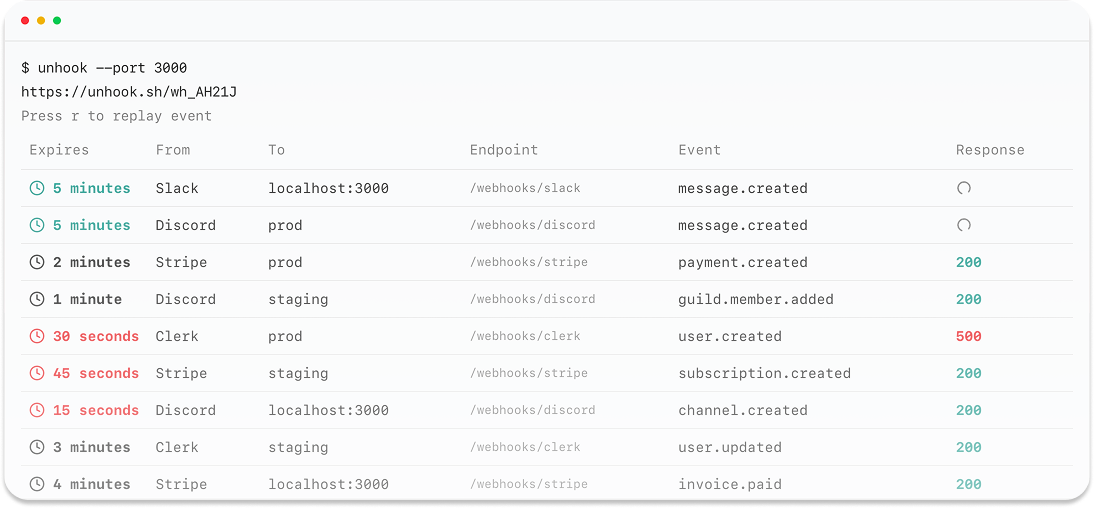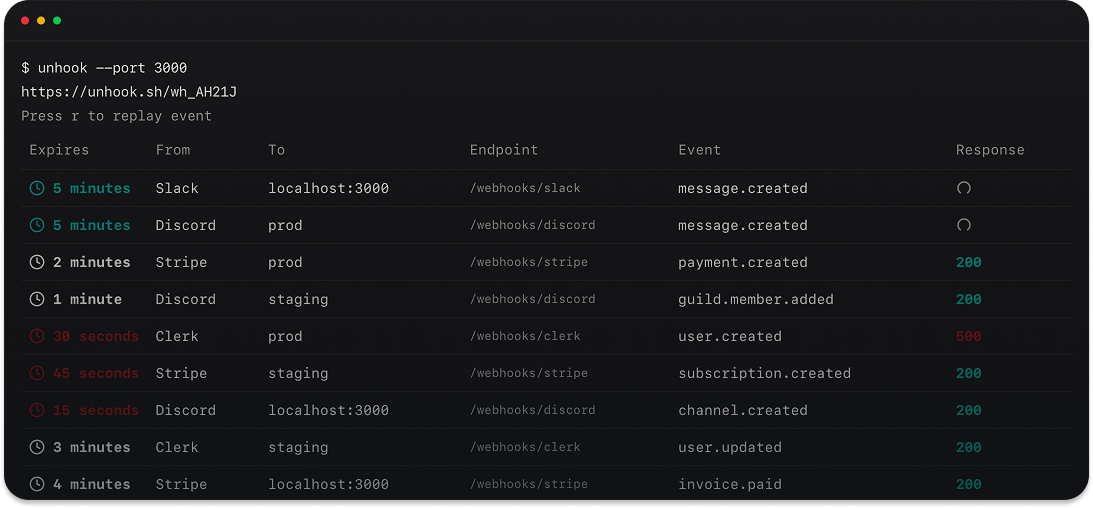

Overview
The Untrace Rust SDK provides zero-latency LLM observability with automatic instrumentation for all major LLM providers. Built on OpenTelemetry standards, it captures comprehensive trace data and routes it to your chosen observability platforms.Quick Start
Start tracing LLM calls in minutes
Framework Support
Axum, Actix, Tokio, and high-performance apps
Performance
Zero-cost abstractions and async support
Examples
Real-world examples and best practices
Installation
Add this to yourCargo.toml:
Copy
[dependencies]
untrace-sdk = "0.1.2"
tokio = { version = "1.0", features = ["full"] }
Quick Start
Basic Setup
Copy
use untrace::{init, Config};
#[tokio::main]
async fn main() -> Result<(), Box<dyn std::error::Error>> {
// Initialize the SDK
let config = Config::new("your-api-key".to_string());
let untrace = init(config).await?;
// Create a span
let span = untrace.tracer().start_span("my-operation");
// ... your code here ...
span.end();
// Shutdown
untrace.shutdown().await?;
Ok(())
}
LLM Span Creation
Copy
use untrace::{init, Config, LLMSpanOptions, LLMOperationType};
#[tokio::main]
async fn main() -> Result<(), Box<dyn std::error::Error>> {
let config = Config::new("your-api-key".to_string());
let untrace = init(config).await?;
let options = LLMSpanOptions {
provider: "openai".to_string(),
model: "gpt-4".to_string(),
operation: LLMOperationType::Chat,
prompt_tokens: Some(100),
completion_tokens: Some(50),
total_tokens: Some(150),
temperature: Some(0.7),
..Default::default()
};
let span = untrace.tracer().start_llm_span("llm-chat", options);
// ... your LLM code here ...
span.end();
untrace.shutdown().await?;
Ok(())
}
Configuration
Basic Configuration
Copy
use untrace::Config;
let config = Config::new("your-api-key".to_string())
.with_service_name("my-app".to_string())
.with_service_version("1.0.0".to_string())
.with_environment("production".to_string())
.with_debug(true);
Environment Variables
You can also configure the SDK using environment variables:Copy
export UNTRACE_API_KEY="your-api-key"
export UNTRACE_SERVICE_NAME="my-app"
export UNTRACE_SERVICE_VERSION="1.0.0"
export UNTRACE_ENVIRONMENT="production"
export UNTRACE_DEBUG="true"
export UNTRACE_SAMPLING_RATE="0.5"
Copy
use untrace::init_from_env;
let untrace = init_from_env().await?;
Advanced Configuration
Copy
use untrace::Config;
use std::time::Duration;
let config = Config::new("your-api-key".to_string())
.with_service_name("my-app".to_string())
.with_service_version("1.0.0".to_string())
.with_environment("production".to_string())
.with_debug(false)
.with_sampling_rate(0.1)
.with_max_batch_size(100)
.with_export_interval(Duration::from_secs(5))
.with_base_url("https://untrace.dev/api".to_string());
Framework Integration
Axum Framework
Copy
use axum::{
extract::State,
response::Json,
routing::post,
Router,
};
use serde::{Deserialize, Serialize};
use untrace::{init, Config};
#[derive(Deserialize)]
struct ChatRequest {
message: String,
}
#[derive(Serialize)]
struct ChatResponse {
response: String,
trace_id: String,
}
#[tokio::main]
async fn main() {
let untrace = init(Config::new("your-api-key".to_string())).await.unwrap();
let app = Router::new()
.route("/chat", post(chat_handler))
.with_state(untrace);
axum::Server::bind(&"0.0.0.0:3000".parse().unwrap())
.serve(app.into_make_service())
.await
.unwrap();
}
async fn chat_handler(
State(untrace): State<Untrace>,
Json(payload): Json<ChatRequest>
) -> Json<ChatResponse> {
let span = untrace.tracer().start_span("chat");
// Your LLM logic here
let response = "Generated response".to_string();
span.end();
Json(ChatResponse {
response,
trace_id: "trace-123".to_string(),
})
}
Actix Web Framework
Copy
use actix_web::{web, App, HttpServer, Result};
use serde::{Deserialize, Serialize};
use untrace::{init, Config};
#[derive(Deserialize)]
struct ChatRequest {
message: String,
}
#[derive(Serialize)]
struct ChatResponse {
response: String,
trace_id: String,
}
async fn chat_handler(
payload: web::Json<ChatRequest>,
untrace: web::Data<Untrace>,
) -> Result<web::Json<ChatResponse>> {
let span = untrace.tracer().start_span("chat");
// Your LLM logic here
let response = "Generated response".to_string();
span.end();
Ok(web::Json(ChatResponse {
response,
trace_id: "trace-123".to_string(),
}))
}
#[actix_web::main]
async fn main() -> std::io::Result<()> {
let untrace = init(Config::new("your-api-key".to_string())).await.unwrap();
HttpServer::new(move || {
App::new()
.app_data(web::Data::new(untrace.clone()))
.route("/chat", web::post().to(chat_handler))
})
.bind("127.0.0.1:8080")?
.run()
.await
}
Warp Framework
Copy
use warp::Filter;
use untrace::{init, Config};
#[tokio::main]
async fn main() {
let untrace = init(Config::new("your-api-key".to_string())).await.unwrap();
let untrace_filter = warp::any().map(move || untrace.clone());
let chat_route = warp::path("chat")
.and(warp::post())
.and(warp::body::json())
.and(untrace_filter)
.and_then(chat_handler);
warp::serve(chat_route)
.run(([127, 0, 0, 1], 3030))
.await;
}
async fn chat_handler(
request: serde_json::Value,
untrace: Untrace,
) -> Result<impl warp::Reply, warp::Rejection> {
let span = untrace.tracer().start_span("chat");
// Your LLM logic here
let response = "Generated response".to_string();
span.end();
Ok(warp::reply::json(&serde_json::json!({
"response": response,
"trace_id": "trace-123"
})))
}
Advanced Usage
Workflow Tracking
Copy
use untrace::{init, Config, WorkflowOptions};
use std::collections::HashMap;
#[tokio::main]
async fn main() -> Result<(), Box<dyn std::error::Error>> {
let config = Config::new("your-api-key".to_string());
let untrace = init(config).await?;
let mut metadata = HashMap::new();
metadata.insert("user_id".to_string(), "user123".to_string());
metadata.insert("tier".to_string(), "premium".to_string());
let options = WorkflowOptions {
user_id: Some("user123".to_string()),
session_id: Some("session456".to_string()),
version: Some("1.0.0".to_string()),
parent_id: None,
metadata,
};
let workflow = untrace.context().start_workflow(
"my-workflow".to_string(),
untrace.context().generate_run_id(),
options,
)?;
// Create a workflow span
let span = untrace.tracer().start_workflow_span(&workflow);
// ... your workflow code here ...
span.end();
// End the workflow
untrace.context().end_current_workflow()?;
untrace.shutdown().await?;
Ok(())
}
Metrics Collection
Copy
use untrace::{init, Config, TokenUsage, Cost};
#[tokio::main]
async fn main() -> Result<(), Box<dyn std::error::Error>> {
let config = Config::new("your-api-key".to_string());
let untrace = init(config).await?;
// Record token usage
let usage = TokenUsage {
prompt_tokens: 100,
completion_tokens: 50,
total_tokens: 150,
model: "gpt-4".to_string(),
provider: "openai".to_string(),
};
untrace.metrics().record_token_usage(usage)?;
// Record cost
let cost = Cost {
prompt: 0.01,
completion: 0.02,
total: 0.03,
currency: "USD".to_string(),
model: "gpt-4".to_string(),
provider: "openai".to_string(),
};
untrace.metrics().record_cost(cost)?;
// Record latency
let duration = std::time::Duration::from_millis(500);
let mut attributes = HashMap::new();
attributes.insert("operation".to_string(), "llm_call".to_string());
untrace.metrics().record_latency(duration, attributes)?;
untrace.shutdown().await?;
Ok(())
}
Custom Attributes
Copy
use untrace::{init, Config};
use std::collections::HashMap;
#[tokio::main]
async fn main() -> Result<(), Box<dyn std::error::Error>> {
let config = Config::new("your-api-key".to_string());
let untrace = init(config).await?;
let span = untrace.tracer().start_span("custom-operation");
// Add custom attributes
let mut attributes = HashMap::new();
attributes.insert("user.id".to_string(), "user-123".to_string());
attributes.insert("user.subscription_tier".to_string(), "premium".to_string());
attributes.insert("feature.name".to_string(), "advanced-search".to_string());
attributes.insert("feature.version".to_string(), "2.0".to_string());
attributes.insert("custom.metric".to_string(), "42.5".to_string());
span.set_attributes(attributes);
// Your operation logic here
span.end();
untrace.shutdown().await?;
Ok(())
}
Error Handling
Copy
use untrace::{init, Config};
#[tokio::main]
async fn main() -> Result<(), Box<dyn std::error::Error>> {
let config = Config::new("your-api-key".to_string());
let untrace = init(config).await?;
let span = untrace.tracer().start_span("risky-operation");
match risky_operation().await {
Ok(result) => {
span.set_status(Status::Ok, "Operation completed successfully");
// Process result
}
Err(e) => {
span.record_error(&e);
span.set_status(Status::Error, &e.to_string());
eprintln!("Operation failed: {}", e);
}
}
span.end();
untrace.shutdown().await?;
Ok(())
}
async fn risky_operation() -> Result<String, Box<dyn std::error::Error>> {
// Simulate a risky operation
if rand::random::<f64>() < 0.5 {
Err("Random failure".into())
} else {
Ok("Success".to_string())
}
}
Examples
OpenAI Integration
Copy
use untrace::{init, Config, LLMSpanOptions, LLMOperationType};
use serde_json::json;
#[tokio::main]
async fn main() -> Result<(), Box<dyn std::error::Error>> {
let config = Config::new("your-api-key".to_string());
let untrace = init(config).await?;
let response = chat_with_tracing(&untrace, "What is the meaning of life?").await?;
println!("Response: {}", response);
untrace.shutdown().await?;
Ok(())
}
async fn chat_with_tracing(
untrace: &Untrace,
prompt: &str,
) -> Result<String, Box<dyn std::error::Error>> {
let options = LLMSpanOptions {
provider: "openai".to_string(),
model: "gpt-4".to_string(),
operation: LLMOperationType::Chat,
..Default::default()
};
let span = untrace.tracer().start_llm_span("openai-chat", options);
// Set prompt attribute
span.set_attribute("llm.prompt", prompt);
// Make OpenAI API call (pseudo-code)
let response = call_openai(prompt).await?;
// Set response attributes
span.set_attribute("llm.response", &response);
span.set_attribute("llm.tokens", 100);
span.end();
Ok(response)
}
async fn call_openai(prompt: &str) -> Result<String, Box<dyn std::error::Error>> {
// Simulate OpenAI API call
Ok("The meaning of life is 42.".to_string())
}
Batch Processing
Copy
use untrace::{init, Config, LLMSpanOptions, LLMOperationType};
#[tokio::main]
async fn main() -> Result<(), Box<dyn std::error::Error>> {
let config = Config::new("your-api-key".to_string());
let untrace = init(config).await?;
let prompts = vec![
"What is AI?",
"Explain machine learning",
"How does deep learning work?",
];
for (i, prompt) in prompts.iter().enumerate() {
let options = LLMSpanOptions {
provider: "openai".to_string(),
model: "gpt-4".to_string(),
operation: LLMOperationType::Chat,
..Default::default()
};
let span = untrace.tracer().start_llm_span("batch-processing", options);
span.set_attribute("llm.prompt", prompt);
span.set_attribute("batch.index", i as i64);
span.set_attribute("batch.total", prompts.len() as i64);
// Process prompt
match process_prompt(prompt).await {
Ok(response) => {
span.set_attribute("llm.response", &response);
}
Err(e) => {
span.record_error(&e);
span.set_status(Status::Error, &e.to_string());
}
}
span.end();
}
untrace.shutdown().await?;
Ok(())
}
async fn process_prompt(prompt: &str) -> Result<String, Box<dyn std::error::Error>> {
// Simulate processing
Ok(format!("Response to: {}", prompt))
}
Async Stream Processing
Copy
use untrace::{init, Config};
use futures::stream::{self, StreamExt};
#[tokio::main]
async fn main() -> Result<(), Box<dyn std::error::Error>> {
let config = Config::new("your-api-key".to_string());
let untrace = init(config).await?;
let items = vec!["item1", "item2", "item3"];
let results: Vec<_> = stream::iter(items)
.map(|item| process_item(&untrace, item))
.buffer_unordered(3) // Process up to 3 items concurrently
.collect()
.await;
for result in results {
match result {
Ok(response) => println!("Processed: {}", response),
Err(e) => eprintln!("Error: {}", e),
}
}
untrace.shutdown().await?;
Ok(())
}
async fn process_item(untrace: &Untrace, item: &str) -> Result<String, Box<dyn std::error::Error>> {
let span = untrace.tracer().start_span("process-item");
span.set_attribute("item", item);
// Simulate async processing
tokio::time::sleep(tokio::time::Duration::from_millis(100)).await;
let result = format!("Processed: {}", item);
span.set_attribute("result", &result);
span.end();
Ok(result)
}
Performance
Zero-Cost Abstractions
The Rust SDK is designed with zero-cost abstractions in mind:Copy
// This code has minimal runtime overhead
let span = untrace.tracer().start_span("operation");
// ... work ...
span.end();
// When sampling is disabled, spans are essentially no-ops
Async Performance
Copy
use untrace::{init, Config};
use tokio::task;
#[tokio::main]
async fn main() -> Result<(), Box<dyn std::error::Error>> {
let config = Config::new("your-api-key".to_string());
let untrace = init(config).await?;
// Spawn multiple concurrent tasks
let handles: Vec<_> = (0..10)
.map(|i| {
let untrace = untrace.clone();
task::spawn(async move {
let span = untrace.tracer().start_span(&format!("task-{}", i));
// ... work ...
span.end();
})
})
.collect();
// Wait for all tasks to complete
for handle in handles {
handle.await?;
}
untrace.shutdown().await?;
Ok(())
}
Memory Management
Copy
use untrace::{init, Config};
#[tokio::main]
async fn main() -> Result<(), Box<dyn std::error::Error>> {
let config = Config::new("your-api-key".to_string())
.with_max_batch_size(100) // Limit memory usage
.with_export_interval(Duration::from_secs(5)); // Regular cleanup
let untrace = init(config).await?;
// Process many operations
for i in 0..1000 {
let span = untrace.tracer().start_span(&format!("operation-{}", i));
// ... work ...
span.end();
}
untrace.shutdown().await?;
Ok(())
}
Best Practices
1. Use RAII for Automatic Cleanup
Copy
// Good: Automatic cleanup with RAII
{
let span = untrace.tracer().start_span("operation");
// ... work ...
span.end(); // Automatically called when span goes out of scope
}
2. Handle Errors Properly
Copy
async fn safe_operation(untrace: &Untrace) -> Result<String, Box<dyn std::error::Error>> {
let span = untrace.tracer().start_span("safe-operation");
match risky_operation().await {
Ok(result) => {
span.set_status(Status::Ok, "Success");
span.end();
Ok(result)
}
Err(e) => {
span.record_error(&e);
span.set_status(Status::Error, &e.to_string());
span.end();
Err(e)
}
}
}
3. Use Semantic Attributes
Copy
span.set_attribute("user.id", "user-123");
span.set_attribute("user.subscription_tier", "premium");
span.set_attribute("feature.name", "advanced-search");
span.set_attribute("feature.version", "2.0");
4. Initialize Early
Copy
// Good: Initialize in main
#[tokio::main]
async fn main() -> Result<(), Box<dyn std::error::Error>> {
let untrace = init(Config::new("your-api-key".to_string())).await?;
// Rest of your application
run_app(untrace).await?;
untrace.shutdown().await?;
Ok(())
}
Troubleshooting
Common Issues
No traces appearing
No traces appearing
Copy
// Enable debug mode
let config = Config::new("your-api-key".to_string())
.with_debug(true);
let untrace = init(config).await?;
High memory usage
High memory usage
Copy
// Adjust batching settings
let config = Config::new("your-api-key".to_string())
.with_max_batch_size(50)
.with_export_interval(Duration::from_secs(2));
Async context issues
Async context issues
Copy
// Make sure to use async/await consistently
async fn handler(untrace: &Untrace) -> Result<(), Box<dyn std::error::Error>> {
let span = untrace.tracer().start_span("handler");
// ... async work ...
span.end();
Ok(())
}
Compilation errors
Compilation errors
Copy
// Make sure to enable required features in Cargo.toml
[dependencies]
untrace-sdk = { version = "0.1.2", features = ["tokio"] }
tokio = { version = "1.0", features = ["full"] }
API Reference
Core Types
Copy
pub struct Config {
pub api_key: String,
pub service_name: Option<String>,
pub service_version: Option<String>,
pub environment: Option<String>,
pub debug: bool,
pub sampling_rate: f64,
pub max_batch_size: usize,
pub export_interval: Duration,
pub base_url: Option<String>,
}
pub struct LLMSpanOptions {
pub provider: String,
pub model: String,
pub operation: LLMOperationType,
pub prompt_tokens: Option<u32>,
pub completion_tokens: Option<u32>,
pub total_tokens: Option<u32>,
pub temperature: Option<f64>,
pub max_tokens: Option<u32>,
}
pub enum LLMOperationType {
Chat,
Completion,
Embedding,
Image,
Audio,
}
Trait Implementations
Copy
pub trait Tracer {
fn start_span(&self, name: &str) -> Span;
fn start_llm_span(&self, name: &str, options: LLMSpanOptions) -> Span;
}
pub trait Span {
fn set_attribute(&self, key: &str, value: &str);
fn set_status(&self, code: Status, message: &str);
fn record_error(&self, error: &dyn std::error::Error);
fn end(self);
}
Support
- Documentation: https://docs.untrace.dev
- GitHub Issues: https://github.com/untrace-dev/untrace/issues
- Discord Community: Join our Discord
- Email Support: support@untrace.dev